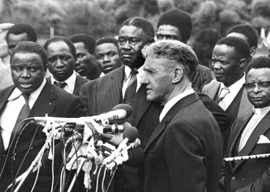
June 21, 2012

Ian Smith
In his book Banana Sunday, Chris Munnion”who covered Africa for the London Daily Telegraph for 20 years”tells a mildly amusing story about the lengths to which the BBC went. He relates events immediately after Ian Smith’s Unilateral Declaration of Independence when Ronald Robson, the BBC’s resident correspondent in Salisbury, looking for “action” that was not there, took a film crew to Cecil Square where many black office workers were dozing during their lunch break. While the cameras rolled he gravely announced, “There has been another revolution in Africa,” with the implication that the prone bodies were dead people victimized by some white-orchestrated horror.
BBC personnel were simultaneously dispatched to broadcast from stations in Zambia and Botswana urging the overthrow of white rule. So much for the corporation’s commitment to impartiality!
Also voluble was the late Christopher Hitchens, who wrote of the “white supremacist junta“ in power in Salisbury and called stridently for British military intervention to remove Smith’s government. In a case of “too late, he cried,” Hitchens later made it known that one of his life’s regrets was remaining silent about Robert Mugabe despite the fact he knew “he had a terrible capacity for fanaticism and absolutism.”
In an article for the Guardian, Sir Max Hastings, former editor of the Daily Telegraph and the Evening Standard who reported on Rhodesia, referred to the white Rhodesians as
…a smug, ruthless white minority, beer guts contained with difficulty inside blazers with RAF crests, proclaiming themselves the guardians of civilisation in the heart of Africa. They killed carelessly, tortured freely, and exploited censorship to conceal their worst excesses.
Those of the above still with us can look at Zimbabwe today and take a bow. They were important players in the exercise to rid the country of a white administration.
Events in the developed world bear a stark resemblance to the Rhodesian experience. While it would be unfair to compare Robert Mugabe to Barack Obama, it is fair to say the American president is also a beneficiary of a biased media which has worked diligently to misinform and suppress uncomfortable truths about the world’s most powerful man. Had the American media scrutinized Obama as closely as they would have treated any white Republican, his road to the White House would have probably been impassable, but another agenda had to be served.
Just as Mugabe rose to power on the back of a dumb electorate and a conniving media, so has Obama. One can only hope the movie doesn”t have the same ending.